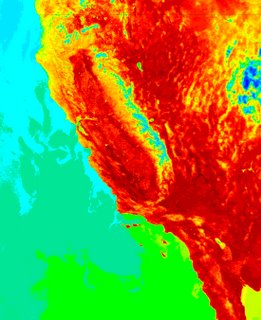 California continues to be held in the grips of a devastating heat wave. For ten straight days temperatures have soared above 100 degrees Fahrenheit, with the heat related death toll now up to 38.
California continues to be held in the grips of a devastating heat wave. For ten straight days temperatures have soared above 100 degrees Fahrenheit, with the heat related death toll now up to 38.
Adding to this is the continued failure of the state's power system, with blackouts affecting 50,000 homes and businesses on Tuesday, down from 1,000,000 over the weekend.
Alongside the human strain are the rotting carcasses of thousands of dead cattle that have also succumbed to the record breaking heat, most of which remain decomposing in the fields because disposal facilities are overwhelmed by the volume of remains that need to be processed.
The story is similar throughout Europe where 40 have died in the past two weeks, and continued high temperatures are straining both power supplies and crops. Nuclear power stations in France and Spain have been forced to cut back production because river water normally used to cool reactors is now too warm, and low water levels in the Po River have impacted hydroelectric power in Rome, knocking out elevators and air conditioners.
However, the hardest hit may be Europe's farming community where estimated losses range from 20% for Poland to 50% in Germany.
None of these impacts are trivial or isolated. Through broad sections of the world human lives, water systems, livestock, farms and economies are paying the price for our continued inaction on global warming.
It begs the question, at what point did it become acceptable for dozens of people to die, for supply shortages to leave 1,000,000 homes to be without power, and for livestock to lie decomposing in the open air?
The facts point towards un-sustainability on a massive scale, and the breadth of that scale no longer exists in the unseen future. Millions of people now live within it's reality and are facing more than the immediate risks of heat, power shortages and limited water. With temperature increases now taking a toll on our food supply, the impacts are coming home to the very foundation of our survival. Nukes aren't going to solve our energy problems if there is no water to cool them, saving water to generate power won't help if our crops are drying up for lack of water, and more fossil fuel energy will only accelerate the effects of global warming we are already experiencing.
While soaring energy prices are driving the economy and making certain people wealthy, it is also eroding the foundations for our future prosperity and creating a debt to the planet - in CO2 - that we won't have a hope of repaying. We need to rethink our business model, before mother nature declares us bankrupt.
Lưu trữ Blog
-
▼
2006
(731)
-
▼
tháng 7
(78)
- Private Developers Invited Into 12 BC Parks
- Oil Sands Given Free Pass for Growth
- Utilities Give Warming Skeptic Big Bucks
- Playlist - 29th July 2006
- i dream patiently
- On The Wire Dub Specials
- Greenpeace Crop Circles Reveal GE Fields
- Conservative's Climate Change Censorship "Orwellian"
- Leaked Memo Reveals Coal Industry Propoganda Plan
- "Roast of the Day"?!
- Story of Esther
- California Heat a Case Study in Un-Sustainability
- Alaska Glacier Photos - Past vs. Present
- Ask Your Doctor
- Greenland Ice-Melt Speeding Up
- The Off-Season
- Victoria Must Tackle Sewage Treatment
- Lovebox
- Running & Brewing (Part II)
- Playlist - 22nd July 2006
- Victoria Required to Clean Up Sewage
- Al Gore on Conan O'Brien Tonight
- Power Cut
- All Canadian Homes to be Zero-Energy by 2030
- Lack of Net Neutrality is Bloggers Biggest Risk
- One Of Those Weeks I Hate
- Love Letters From A Women
- Orwell's Ghost Haunts Kyoto
- A New Episode is On The Way
- VoW - Will Ferrel as George W. on Global Warming
- Population : One - One Person is One Pixel
- First Half of 2006 Hottest On Record
- Schwarzenegger/California in Global Warming Lead
- Heatwave
- Global Warming Skeptics Go Nuclear
- My Blahg » Teaching the Next Generation to Hate
- Return to the Beginning
- Spotted Owl Nest Destroyed
- G8 Energy Plan Relies on Oil, Nuclear & Renewables
- Running & Brewing
- Playlist - 15th July 2006 - Funkology
- Burrowing Owl Returns to Manitoba
- Wal-Mart's Sustainability Drive
- Rental Property Available
- New Episodes and Schedule
- Slamming the Climate Skeptic Scam
- An End to Victoria's Sewage Dumping?
- Video of the Week - 3 out of 4 Conservative Agree
- The Canary Project - What Global Warming Looks Like
- The Future of Free Trade and the Environment
- The Office
- New Act Could Ban Dangerous Pesticides
- Hitting Us Where It Hurts
- Climate Change - Business Leads, Government Fails
- Al Gore on The Daily Show - Part 2
- Al Gore on The Daily Show - Part 1
- Chinese Claim 20% Boost to Wind Generation
- China's War on Weather
- Schwarzenegger's Green Power Push
- Welcome to the First Episode of Blog Talk with Mat...
- Yogic Bliss
- Toes
- Playlist - 8th July 2006
- Burning Fossil Fuels Erodes Coral Reefs
- Giant Cracks Appear in Brazilian Dam
- Ethanol Could Replace 30% of Gasoline
- hypnotic dreams
- Oilcaholics Anonymous: Klein vs. Gore
- Death by Lexis-Nexis
- Climate Change, errrr "Pine Beetles" Threatens Boreal
- Ottawa Adds to Toxic List
- Video of the Week: Who Killed the Electric Car?
- Supreme Power
- It's All Babies, All The Time!
- Human on Display
- Letter
- Purchase of the Bellwood Quarry
- Playlist - 1st July 2006 - Baked Goods
-
▼
tháng 7
(78)